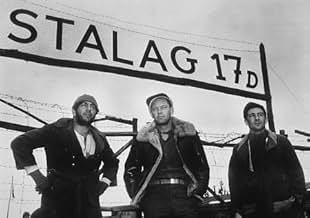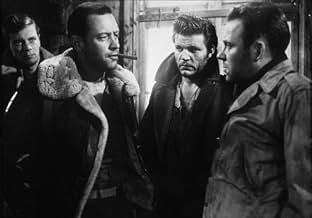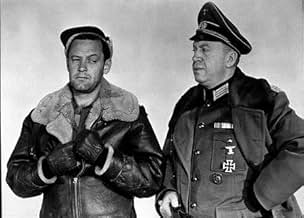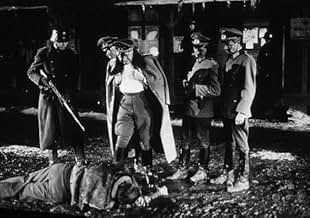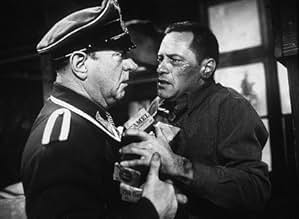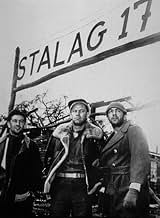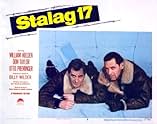AVALIAÇÃO DA IMDb
7,9/10
60 mil
SUA AVALIAÇÃO
Uma mistura de comédia e cinismo, esta é a história de um grupo de GI que são colocados juntos no famoso campo de prisão alemão Stalag 17, suas suspeitas de que alguém seja um espião e seus ... Ler tudoUma mistura de comédia e cinismo, esta é a história de um grupo de GI que são colocados juntos no famoso campo de prisão alemão Stalag 17, suas suspeitas de que alguém seja um espião e seus esforços para escapar.Uma mistura de comédia e cinismo, esta é a história de um grupo de GI que são colocados juntos no famoso campo de prisão alemão Stalag 17, suas suspeitas de que alguém seja um espião e seus esforços para escapar.
- Direção
- Roteiristas
- Artistas
- Ganhou 1 Oscar
- 2 vitórias e 8 indicações no total
Gil Stratton
- Sgt. Clarence Harvey 'Cookie' Cook
- (as Gil Stratton Jr.)
Avaliações em destaque
This is one of Billy Wilder's best films and still stands up very well today. Unlike the concentration camps of the Holocaust, prison camps for Allied prisoners were actually not all that bad in comparison (except for how the Russian prisoners were treated--they were often just shot). So, the prisoners enjoyed a little more freedom and were constantly trying to deal with the incredible boredom of being locked up with very little to do. As a result, films about these camps (such as this one and THE GREAT ESCAPE) are few and far between--they would just be too dull to merit a movie. However, in the case of this film, the monotony is disrupted because there apparently is a snitch within the prisoners' ranks--some rat is tipping off the Commandant (director Otto Preminger--in one of his few acting roles) about escape attempts, major rule infractions and who the actual perpetrator of a major act of sabotage was.
Naturally, prisoners begin to think that William Holden is the snitch. After all, he is living incredibly well compared to all the other Allied prisoners in the camp due to all his money-making schemes and black market activities. In addition, he is so cynical and apparently unpatriotic that he has no desire to escape--he's more than willing to sit tight until the war is over since he is safe and happy! In this role, Holden's character is VERY similar to the one he played in BRIDGE OVER THE RIVER KWAI--where he is also a schemer and mostly focused on saving his own sorry butt! However, the problem of the snitch isn't so simply solved and much of the film is about how Holden proves he was NOT the spy for the Germans.
The movie is odd in that it is a combination of both drama and comedy--with alternating moods throughout the film. Some of the ways the bored prisoners create their own fun are incredibly funny (especially the "MEIN KAMPF" scene) and some of the moments are poignant and exciting (such as the escape at the end of the film). All this comes together wonderfully in the marvelous ending of the film. The movie features exceptional acting, writing and direction and is one of the best WWII films ever made. See it--it's well worth your time.
Naturally, prisoners begin to think that William Holden is the snitch. After all, he is living incredibly well compared to all the other Allied prisoners in the camp due to all his money-making schemes and black market activities. In addition, he is so cynical and apparently unpatriotic that he has no desire to escape--he's more than willing to sit tight until the war is over since he is safe and happy! In this role, Holden's character is VERY similar to the one he played in BRIDGE OVER THE RIVER KWAI--where he is also a schemer and mostly focused on saving his own sorry butt! However, the problem of the snitch isn't so simply solved and much of the film is about how Holden proves he was NOT the spy for the Germans.
The movie is odd in that it is a combination of both drama and comedy--with alternating moods throughout the film. Some of the ways the bored prisoners create their own fun are incredibly funny (especially the "MEIN KAMPF" scene) and some of the moments are poignant and exciting (such as the escape at the end of the film). All this comes together wonderfully in the marvelous ending of the film. The movie features exceptional acting, writing and direction and is one of the best WWII films ever made. See it--it's well worth your time.
Director Billy Wilder was certainly no stranger to the horrors of World War Two. He was born in Austria-Hungary {now Poland} in 1906, but moved to Berlin to begin a career in movies. However, following the rise of Adolf Hitler, Wilder being Jewish fled for Paris and then the United States. His mother, grandmother and stepfather died at the Auschwitz concentration camp. As such, I think it'd be safe to presume that Wilder housed a considerable hatred towards Nazis, which makes his POW-picture, 'Stalag 17 (1953),' all the more remarkable. Whereas the film might have developed into a bleak, depressing drama, the screenplay by Wilder and Edwin Blum {adapted from a play by Donald Bevan and Edmund Trzcinski} effortlessly blends drama and comedy, clearing the path for other similarly-themed war-time films {David Lean's 'The Bridge on the River Kwai (1957)' and John Sturges' 'The Great Escape (1963)'} and even TV series {'Hogan's Heroes (1965-1971)' clearly used Wilder's film as a template including an identical Sgt. Schulz despite a failed court case in which producers sued for infringement}.
The year is 1944, in the week before Christmas. Stalag 17, a Nazi prisoner-of-war camp, is situated somewhere along the Danube River, and hundreds of captured Allied sergeants have been imprisoned there. The Americans of Barrack 4 endure a dull, deprived lifestyle, with each day consisting of unwholesome meals, tedious labour and uncomfortable living conditions. Displaying that typical American cleverness and resourcefulness, many of the prisoners have banded together to ensure themselves a few added luxuries such a makeshift radio to listen to the latest war news and to build an effective escape tunnel beneath the camp. However, it soon becomes apparent that there is a Nazi spy within their midst. After two escaping prisoners are immediately shot down, and their escape passage is inexplicably discovered, the men turn their suspicions towards J.J. Sefton (William Holden), a selfish and arrogant prisoner with a dog-eat-dog mentality that sees him openly bribing the German guards for luxuries. An unsympathetic character, one who nonetheless exhibits a certain streak of integrity, Sefton decides to uncover the true traitor of Barrack 4.
Though he was reluctant to play such an unlikable character, Holden won the Best Actor Oscar for his powerful performance {via the second-shortest acceptance speech in Academy Awards history a simple "thank you"}. The other actors in the film also create distinct and likable personalities, and I particularly enjoyed the big, oafish Animal (Robert Strauss) and Shapiro (Harvey Lembeck). Goodness knows what compelled the writers to make Sgt. Schulz (Sig Ruman), a loathsome tyrant in any other film, a jolly and hearty buffoon, but it works absolutely perfectly, his character's incompetence best highlighted in the sequence where he is distracted into playing volleyball, and enjoys the game so much that he hands his loaded weapon to the nearest POW. As Sefton attempts to uncover which fellow prisoner is leaving secret messages for their Nazis captors, Wilder intersperses the drama with an episodic flow of comedic situations, placing particularly emphasis on the means by which prisoners will alleviate their desire for the opposite sex. A hilarious sequence sees the drunken Animal mistaking his dressed-up bunk-mate for the cinema beauty Betty Grable, of whom he has an undying obsession.
The year is 1944, in the week before Christmas. Stalag 17, a Nazi prisoner-of-war camp, is situated somewhere along the Danube River, and hundreds of captured Allied sergeants have been imprisoned there. The Americans of Barrack 4 endure a dull, deprived lifestyle, with each day consisting of unwholesome meals, tedious labour and uncomfortable living conditions. Displaying that typical American cleverness and resourcefulness, many of the prisoners have banded together to ensure themselves a few added luxuries such a makeshift radio to listen to the latest war news and to build an effective escape tunnel beneath the camp. However, it soon becomes apparent that there is a Nazi spy within their midst. After two escaping prisoners are immediately shot down, and their escape passage is inexplicably discovered, the men turn their suspicions towards J.J. Sefton (William Holden), a selfish and arrogant prisoner with a dog-eat-dog mentality that sees him openly bribing the German guards for luxuries. An unsympathetic character, one who nonetheless exhibits a certain streak of integrity, Sefton decides to uncover the true traitor of Barrack 4.
Though he was reluctant to play such an unlikable character, Holden won the Best Actor Oscar for his powerful performance {via the second-shortest acceptance speech in Academy Awards history a simple "thank you"}. The other actors in the film also create distinct and likable personalities, and I particularly enjoyed the big, oafish Animal (Robert Strauss) and Shapiro (Harvey Lembeck). Goodness knows what compelled the writers to make Sgt. Schulz (Sig Ruman), a loathsome tyrant in any other film, a jolly and hearty buffoon, but it works absolutely perfectly, his character's incompetence best highlighted in the sequence where he is distracted into playing volleyball, and enjoys the game so much that he hands his loaded weapon to the nearest POW. As Sefton attempts to uncover which fellow prisoner is leaving secret messages for their Nazis captors, Wilder intersperses the drama with an episodic flow of comedic situations, placing particularly emphasis on the means by which prisoners will alleviate their desire for the opposite sex. A hilarious sequence sees the drunken Animal mistaking his dressed-up bunk-mate for the cinema beauty Betty Grable, of whom he has an undying obsession.
William Holden is always in the shadows in `Stalag 17', he's always behind the characters or off to the side of the camera. You see, despite Holden's character Sgt. J.J. Sefton being the film's main character, he is only seen through the eyes of his fellow POWs, rarely ever alone. When they start to think he's the spy so do we. Oh, sure, we know he isn't the rat (movies don't do things like that), but since the story is told by all of the POWs who think Sefton is the rat, we start to think like them too. That is the mastery of Billy Wilder's `Stalag 17', it takes the film's most interesting character and sets him apart from the rest for most of the film, letting us learn about him as the characters do.
The story focuses on a group of POWs living in the American section of Stalag 17, supposedly the 's best POW camp. Among them are barracks chief Hoffy (Richard Erdman), Price (Peter Graves), Shapiro (Harvey Lembeck) and Animal Casava (Robert Strauss). They all have their own special job when their fellow prisoners try to escape, Price, for instance, is security'. The film starts when two prisoners try to escape the barracks. Everyone inside is enthused, thinking the two will make it very far, except Sefton, who bets precious cigarettes that they wont make it past the outer forest. When he turns out to be right the POWs start thinking there's a rat and that rat is Sefton. And as the first hour passes we think so too, it's only logical, Sefton has any luxuries because of his deals with the s.
The POWs start to bully Sefton, and once they beat him to a pulp he decides to discover who the real rat is (at this point, of course, we know he is ). His investigation isn't handled with dialogue though, we get this by seeing his facial expressions and his lurking in the shadows of the barracks.
So, what starts as a light, `gung-ho' type war movie (there's lots of comedy in the first hour) turns into a dark, sort of gritty thriller with a twist that left me with my mouth open. I wont reveal it, but I'll just say that Sefton smartly solves the mystery and redeems himself to the rest of the barracks (I didn't spoil anything, come on, it's expected).
As I said, there's lots of comedy in the first hour and some in the second, mostly from Strauss and Lembeck's characters. Some of the comedy is key in showing how these characters cope with their nearly hopeless situation, handled well by Wilder and the actors (Strauss' performance even gained him an Oscar nomination) but some of it just seems tacked on and out of place, like when a drunken Strauss thinks that Lembeck is a hell.
But that is a small qualm, and the rest of the film is excellent. The direction and writing are great in showing us a war film, a mystery, a thriller and a dark comedy all at once. I'd have to say I like the acting the most though, Holden (who won a leading Oscar for his work in this) is suave and charming, as well as mischievous and cynical, he creates a real `cool' character without trying too. And the rest of the cast - Graves, Otto Preminger - are admirable as well. The POWs aren't clichés or caricatures, they're all their own separate people.
`Stalag 17' is great as a war movie, a mystery, a thriller and a dark comedy. It's a classic film, for all who appreciate good cinema, 8.5/10.
The story focuses on a group of POWs living in the American section of Stalag 17, supposedly the 's best POW camp. Among them are barracks chief Hoffy (Richard Erdman), Price (Peter Graves), Shapiro (Harvey Lembeck) and Animal Casava (Robert Strauss). They all have their own special job when their fellow prisoners try to escape, Price, for instance, is security'. The film starts when two prisoners try to escape the barracks. Everyone inside is enthused, thinking the two will make it very far, except Sefton, who bets precious cigarettes that they wont make it past the outer forest. When he turns out to be right the POWs start thinking there's a rat and that rat is Sefton. And as the first hour passes we think so too, it's only logical, Sefton has any luxuries because of his deals with the s.
The POWs start to bully Sefton, and once they beat him to a pulp he decides to discover who the real rat is (at this point, of course, we know he is ). His investigation isn't handled with dialogue though, we get this by seeing his facial expressions and his lurking in the shadows of the barracks.
So, what starts as a light, `gung-ho' type war movie (there's lots of comedy in the first hour) turns into a dark, sort of gritty thriller with a twist that left me with my mouth open. I wont reveal it, but I'll just say that Sefton smartly solves the mystery and redeems himself to the rest of the barracks (I didn't spoil anything, come on, it's expected).
As I said, there's lots of comedy in the first hour and some in the second, mostly from Strauss and Lembeck's characters. Some of the comedy is key in showing how these characters cope with their nearly hopeless situation, handled well by Wilder and the actors (Strauss' performance even gained him an Oscar nomination) but some of it just seems tacked on and out of place, like when a drunken Strauss thinks that Lembeck is a hell.
But that is a small qualm, and the rest of the film is excellent. The direction and writing are great in showing us a war film, a mystery, a thriller and a dark comedy all at once. I'd have to say I like the acting the most though, Holden (who won a leading Oscar for his work in this) is suave and charming, as well as mischievous and cynical, he creates a real `cool' character without trying too. And the rest of the cast - Graves, Otto Preminger - are admirable as well. The POWs aren't clichés or caricatures, they're all their own separate people.
`Stalag 17' is great as a war movie, a mystery, a thriller and a dark comedy. It's a classic film, for all who appreciate good cinema, 8.5/10.
This absorbing and very entertaining movie creates a believable and interesting cast of characters, puts them into an intriguing story, and uses its settings, props, and other resources very creatively. It is a fine combination of drama and comic relief that stands up very well against anything else of its type. The setting and atmosphere are quite believable, and they make it easy to enter the characters' world.
The opening sequence sets up everything nicely, with most of POW's helping two of the prisoners in an escape attempt, while William Holden as the cynical Sefton separates himself from the rest. Sefton is interesting enough as it is, a man who simply by remaining true to his nature cannot help arousing suspicion and antagonism, and Holden was quite a good choice to play him. The story builds up nicely, with developments coming at a careful pace, and some good stretches of lighter material.
There are numerous interesting characters and good performances among the other prisoners, and in particular Robert Strauss and Harvey Lembeck steal more than one scene with their antics which, though goofy, are also an appropriate complement to the main plot and the setting. The German characters are more stylized, but both Sig Ruman and Otto Preminger make them come to life, and help them fit in seamlessly with the others.
Billy Wilder's direction and the photography also deserve praise. Besides the way that each sequence fits together so nicely with the others, there are several individual scenes and shots that are done in an impressive fashion - not flashy, but creative and thoughtful. The scene with Holden lying on his cot while most of the others sing and celebrate is one particularly good example. There is a wealth of good material throughout, making "Stalag 17" a classic that has lost nothing over the years, and one that can be seen and enjoyed several times.
The opening sequence sets up everything nicely, with most of POW's helping two of the prisoners in an escape attempt, while William Holden as the cynical Sefton separates himself from the rest. Sefton is interesting enough as it is, a man who simply by remaining true to his nature cannot help arousing suspicion and antagonism, and Holden was quite a good choice to play him. The story builds up nicely, with developments coming at a careful pace, and some good stretches of lighter material.
There are numerous interesting characters and good performances among the other prisoners, and in particular Robert Strauss and Harvey Lembeck steal more than one scene with their antics which, though goofy, are also an appropriate complement to the main plot and the setting. The German characters are more stylized, but both Sig Ruman and Otto Preminger make them come to life, and help them fit in seamlessly with the others.
Billy Wilder's direction and the photography also deserve praise. Besides the way that each sequence fits together so nicely with the others, there are several individual scenes and shots that are done in an impressive fashion - not flashy, but creative and thoughtful. The scene with Holden lying on his cot while most of the others sing and celebrate is one particularly good example. There is a wealth of good material throughout, making "Stalag 17" a classic that has lost nothing over the years, and one that can be seen and enjoyed several times.
In his lengthy and eventful career, Billy Wilder created many films that have rightly attained classic status, but his WWII prisoner of war comedy-drama Stalag 17 is arguably one of his best. The scripting is a perfect example of how to marry a tight plot with sharp dialogue and great characters, and the acting is flawless on all counts. While William Holden's performance as the cynical American sergeant rightly won him an Oscar, it is the comic antics of Robert Strauss and Harvey Lembeck that steal the show. And if there was ever a more entertaining ensemble of previously unseen (and sadly subsequently unheard of) supporting players - with the possible exception of Casablanca - I would love to see it. This film predates the more famous WWII pow film The Great Escape by more than a decade, but had Wilder, Holden and company not caused havoc in Stalag 17, the world would never have seen Steve McQueen play the cooler king with such wry aplomb. Stalag 17 is easily one of the finest films of its time, if not of all time, and I would encourage anyone who has never experienced its unique blend of cynicism, comedy, suspense and drama to check it out at the earliest available opportunity.
Você sabia?
- CuriosidadesWilliam Holden never felt he deserved an Oscar for his performance in this film. His wife felt it was to compensate for him not winning for "Crepúsculo dos Deuses (1950)."
- Erros de gravaçãoIt's December 1944. Every morning at 6:00 it's roll call for the prisoners of Stalag 17. Although in the middle of December, in southern Germany the sun will never rise before 8:00; the roll call in the movie is in full daylight.
- ConexõesFeatured in Paramount Presents (1974)
- Trilhas sonorasWhen Johnny Comes Marching Home
(1863) (uncredited)
Written by Louis Lambert
Played during the opening credits
Played on a record and sung by the prisoners of war
Whistled a bit by Gil Stratton at the end
Principais escolhas
Faça login para avaliar e ver a lista de recomendações personalizadas
Detalhes
- Data de lançamento
- País de origem
- Idiomas
- Também conhecido como
- Inferno Nº 17
- Locações de filme
- Empresa de produção
- Consulte mais créditos da empresa na IMDbPro
Bilheteria
- Orçamento
- US$ 1.661.530 (estimativa)
- Tempo de duração2 horas
- Cor
- Proporção
- 1.37 : 1
Contribua para esta página
Sugerir uma alteração ou adicionar conteúdo ausente

Principal brecha
By what name was O Inferno Nº 17 (1953) officially released in India in Hindi?
Responda


